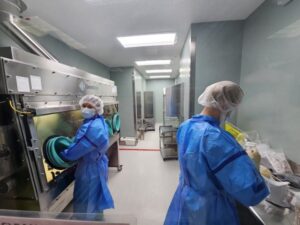
Story by Kevin Larson
Winn Army Community Hospital
A project eight years in the making had its ribbon cutting ceremony Oct. 2 at Winn Army Community Hospital.
With a celebration complete with oversized scissors, a purple ribbon, balloons, confetti and chocolate cake, staff and pharmacy specialists celebrated the official opening of the hospital’s inpatient pharmacy clean room. The facility ensures the safe preparation of sterile medicines, including intravenous drugs, for inpatient use.
The clean room adheres to Joint Commission standards, said Winn pharmacy chief Maj. Jason Cha. The facility also provides training for Soldiers specializing in pharmaceuticals on doing the same task in a combat environment.
“It will allow them to be ready and fully trained so when they deploy, they’re able to do this in an austere environment,” Cha said. “It not only supports Winn Soldiers, but also Soldiers within the region, whether at Hunter Army Airfield, the 14th Combat Support Hospital or the 3rd Infantry Division. We have pharmacy technicians and pharmacists everywhere in the region. This is going to be a huge addition for our readiness and serve as a force multiplier.”
Director and hospital commander Col. Margaret Berryman echoed the readiness component the new capability offers the hospital.
“We are a health readiness platform,” Berryman said. “We want to make sure we’ve got the capability to give all our pharmacists, our pharmacy techs and our team, the ability to train at this level.”
Having the ability to now make vital sterile drugs in an in-house, climate-controlled facility is a benefit for Winn, said inpatient pharmacist Adrian Bell. Because of the new fiscal year, the hospital is currently unable to acquire an externally sourced, pre-made drug compound used for labor management, she said. Now that same compound in-house under strict environmental controls with the clean room.
“We have a gap and it needs to be made,” Bell said. “It allows us to bridge those kinds of gaps and provide sterile products.”
The safe shelf life of the in-house made drugs is also longer, Bell said. Externally sourced sterile drugs could only be guaranteed to be safe for 24 hours. By making the drugs in the facility, the shelf life is extended significantly.
“With the room, we can now guarantee it for up to ten days,” she said.
Berryman thanked the pharmacy staff for its persistence in completing the project because it buttresses the hospital’s mission.
“We want to provide high quality and safe care to our beneficiaries,” she said.